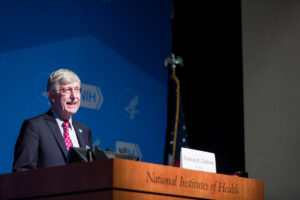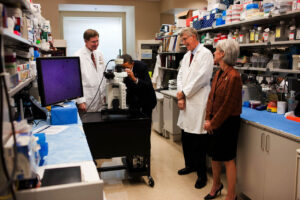


Group Founded by Francis Collins Launches PR Campaign for “Science”

From Christianity Today to Christianity Astray?

WORLD Magazine’s Review of Stockholm Syndrome Christianity
John Mac Ghlionn at WORLD recently reviewed Stockholm Syndrome Christianity: The term Stockholm syndrome entered the public consciousness after a strange bank robbery decades ago. In 1973, in Stockholm, Sweden, the hostages, who had spent days under threat, shocked the world when they began sympathizing with their captors and even defended them to the police. Psychologists came to see this as a survival strategy. When escape seems out of reach, identifying with the person who holds power feels safer. It’s a coping mechanism, an emotional pivot away from fear and toward anything that promises security—even if it means embracing the very forces that endanger you. John G. West’s new book, Stockholm Syndrome Christianity: Why America’s Christian Leaders Are Failing—and What We Can Do Read More ›

How Christian Universities Fail
Harvard, Princeton, Yale, and many other universities were founded explicitly as Protestant Christian institutions, only to devolve over time into something else. So in the latter half of the nineteenth century, evangelical Protestants in America started again, creating a new generation of colleges and seminaries they hoped would avoid the mistakes of their predecessors. But as the current controversy over Wheaton College attests, history seems to be repeating itself. And the problem reaches far beyond Wheaton. For twelve years I served as a professor at Seattle Pacific University (SPU). Founded by pious Free Methodists in the 1890s, the school is another historically evangelical institution like Wheaton. While there, I was able to witness firsthand how a Christian university deconstructs. To be sure, Seattle Pacific Read More ›

Francis Collins Stands Up for DEI, High Overhead, and Unethical Research?

The Tragedy of Francis Collins
Late last week, Christian geneticist Francis Collins resigned abruptly as a researcher at the National Institutes of Health (NIH). On Wednesday this week, the U.S. Senate held a confirmation hearing for a new NIH director, Stanford University medical professor Jay Bhattacharya, a fellow Christian who Collins privately disparaged as one of “three fringe epidemiologists” during the COVID crisis.
In many ways, the transition marks the end of an era.
For nearly two decades, Collins has been the most prominent — and powerful — Evangelical Christian scientist in America. After leading the Human Genome Project, Collins served as director of the NIH for 12 years (2009-2021). He then became acting White House Science Advisor in the Biden Administration.
During these years, Collins was celebrated by many Evangelicals because of his acceptance by the secular establishment. However, those Christians might have been wise to reflect on why the establishment has been so approving of Collins.
In 2019, the journal Science noted that when Collins originally was appointed as NIH director by President Barack Obama, some worried “that his outspoken Christian faith would influence his leadership.” But Science went on to assure readers that the critics need not have worried: “His religion never became an issue — he followed Obama’s order to loosen rules for stem cell research, which some Christians oppose, and has defended fetal tissue research despite criticism from antiabortion groups.”
Read More ›
Darwin, Kinsey, and Stockholm Syndrome Christianity

Francis Collins and Stockholm Syndrome Christianity
